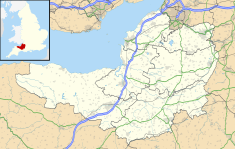
Shepherd Neame is an English independent brewery which has been based in the market town of Faversham, Kent, for over 300 years. While 1698 is the brewery's official established date, town records show that commercial brewing has occurred on the site since 1573. Since the brewery's formation in the 16th century, ownership has passed in unbroken succession through five families. The brewery produces a range of cask ales and filtered beers. Production is around 180,000 brewers' barrels a year. It has 303 pubs and hotels in South East England, predominantly in Kent and London. The company exports to 44 countries, including India, Sweden, Italy, Brazil, and Canada.
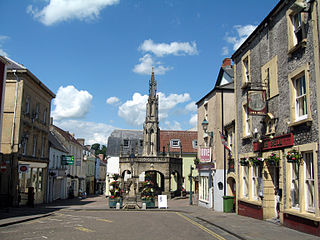
Shepton Mallet is a market town and civil parish in Somerset, England, some 16 miles (26 km) south-west of Bath, 18 miles (29 km) south of Bristol and 5 miles (8.0 km) east of Wells. It had an estimated population of 10,810 in 2019. Mendip District Council was based there. The Mendip Hills lie to the north and the River Sheppey runs through the town, as does the route of the Fosse Way, the main Roman road between north-east and south-west England. There is evidence of Roman settlement. Its listed buildings include a medieval parish church. Shepton Mallet Prison was England's oldest, but closed in March 2013. The medieval wool trade gave way to trades such as brewing in the 18th century. It remains noted for cider production. It is the closest town to the Glastonbury Festival and nearby the Royal Bath and West of England Society showground.
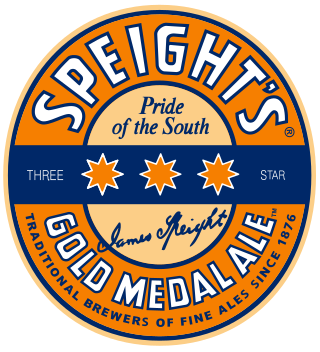
Speight's is a beer brand and a brewery located in Dunedin, New Zealand. The brand is owned by the Japanese-controlled holding company Lion, itself a subsidiary of Kirin. Speight's is best known for its Gold Medal Ale, one of the best-selling beers in New Zealand. The brewery also includes a chain of "Speight's Ale House" gastropubs across the country.
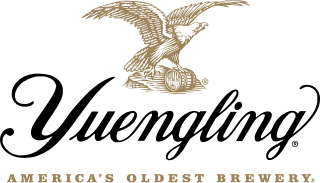
D. G. Yuengling & Son, established in 1829, is the oldest operating brewing company in the United States. In 2018, by volume of sales, it was the largest craft brewery, sixth largest overall brewery and largest wholly American-owned brewery in the United States. Its headquarters are in Pottsville, Pennsylvania. In 2015, Yuengling produced about 2.9 million barrels, operating two Pennsylvania facilities and a brewery in Tampa, Florida.
Big Rock Brewery is a Canadian public company and the largest brewery that is based in Calgary, Alberta, Canada. As of March 2020, it was also Canada's largest craft brewery. Additional brewing operations are located in Vancouver, British Columbia; Etobicoke, Ontario; and Liberty Village in Toronto, Ontario. Big Rock distributes a variety of beers and ciders throughout Canada.
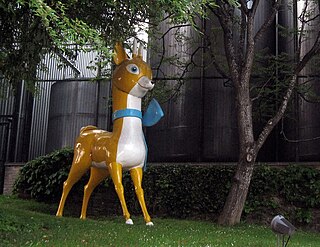
Babycham is a light, sparkling perry invented by Francis Showering, a brewer in Shepton Mallet in Somerset, England. The name was owned by Accolade Wines until December 2021 when it was bought back into the Showering family business Brothers Drinks Limited. The brand was particularly popular during the 1960s and 1970s. The new owners are planning a major rebrand and relaunch of the drink.

Tennent Caledonian is a brewing company based in Glasgow, Scotland.
The Swan Brewery is a brewing company, whose high profile brewery was once located beside the Swan River, in Perth, Western Australia.

Stevens Point Brewery is a regional American brewery located in Stevens Point, Wisconsin. The brewery is the fifth-oldest continuously operating brewery and the third-oldest privately owned brewery in the nation.

Cascade Brewery is a brewery established in 1824 in South Hobart, Tasmania, and is the oldest continually operating brewery in Australia.
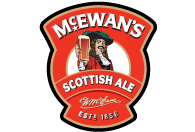
McEwan's is a brand of beer owned by Carlsberg Marston's Brewing Company. It was originally brewed by William McEwan's Fountain Brewery in Edinburgh, Scotland. The McEwan's brand passed to Heineken in 2008 after their purchase of Scottish & Newcastle's British operations. Heineken sold the brand to Wells & Young's in 2011, who sold their brewing operation, including the McEwan brand to Marston's in 2017. Cans and bottles are now brewed in Bedford, England.

Fuller's Brewery in Chiswick, west London, England, is the former brewing division of Fuller, Smith & Turner PLC. It was a family-run business from its foundation in 1845 until 2019, when it was sold to the Japanese international beverage giant Asahi.

Brewing in Ireland has a long history. Production currently stands at over 8 million hectolitres, and approximately half the alcohol consumed is beer.
Plzeňský Prazdroj, a. s. is a Czech brewery which opened in 1842 in Plzeň, Bohemia. It was the first brewery to produce a pale lager, branded as Pilsner Urquell, which became so popular and was so much copied that more than two-thirds of the beer produced in the world today is pale lager, sometimes named pils, pilsner and pilsener after Pilsner Urquell. The brewery name, Pilsner Urquell, which can be roughly translated into English as "the original source at Pilsen", was adopted as a trademark in 1898. Pilsner Urquell is the largest producer and exporter of beer in the Czech Republic.

George Killian's Irish Red is a red beer, produced and sold in France by Heineken France, and under license in the United States by Molson Coors under the trade name Unibev. Despite the differences in the brewing methods, the marketing of both beers claim legacy to an Irish "original recipe".
Brothers Cider is a brand of fruit cider originating in Somerset in South West England. Originally available at music festivals, it is now sold in pubs, bars, and stores across the United Kingdom and internationally in countries such as Thailand, Singapore, and China.
The International Brewing Awards, previously known as the Brewing Industry International Awards (BIIA), is a biannual brewing competition with its origins dating to 1886. It is believed to be the oldest international brewing competition in the world.

Stones Brewery was a brewery founded in 1868 by William Stones in Sheffield, West Riding of Yorkshire, England, and purchased by Bass Brewery in 1968. After its closure in 1999, its major brand, Stones Bitter, has continued to be produced by the Molson Coors Brewing Company.

Lager is a type of beer brewed and conditioned at low temperature. Lagers can be pale, amber, or dark. Pale lager is the most widely consumed and commercially available style of beer. The term "lager" comes from the German word for "storage", as the beer was stored before drinking, traditionally in the same cool caves in which it was fermented.

Curious Brewing is a brewery in Ashford, Kent, England. It was established in 2011 by the Kent-based winery group Chapel Down.

